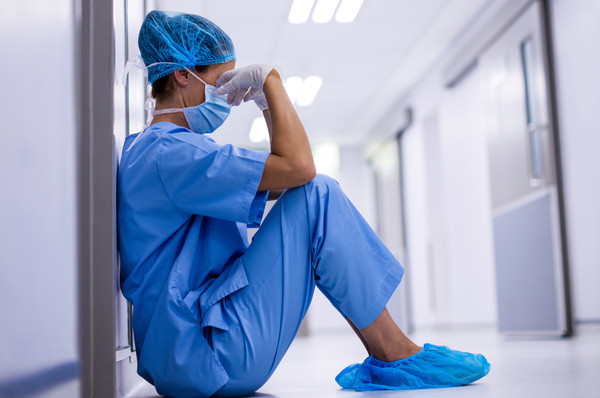The government’s move to redirect some of the budgets for allowances for Covid-19 treating healthcare workers to hold an international conference sparked a controversy in the medical community.
Also, industry watchers said that the government’s six-month delay in paying allowances to healthcare workers treating Covid-19 had become a serious problem.

The government allocated 180 billion won ($134.8 million) for Covid-19 infection control allowances this year and has executed 140 billion won (77.8 percent).
However, the government paid the allowances only until February.
The government introduced infection control allowances in January, which will be available only until September.
According to data submitted to Rep. Shin Hyun-young of the opposition Democratic Party by the Korea Disease Control and Prevention Agency (KDCA), the government has paid 39.04 billion won in infection control allowances as of Friday. These are payments for the work done until February, and claims for March are in progress.
Over 205,000 healthcare professionals applied for infection control allowances, but only 47 percent have received the money.
It is not unusual for physicians and nurses to face late allowance payments.
Doctors said Covid-19 treating physicians received January allowances in May.
“Some of the people who had to get the allowances have already left the hospital,” an official at a university hospital said.
In response to the controversy over the government’s redirection of the infection control incentive budget to international conference costs, the Central Disease Control Headquarters (CDCH) said there would be no problem paying the allowances fully.
Im Sook-young, a senior official at CDCH, said in a regular Covid-19 briefing on Tuesday that the government would pay infection control allowances as initially planned. Also, the payments will go to subcontract healthcare workers without a glitch, as the National Human Rights Commission of Korea recommended.
The infection control allowances are paid after the National Health Insurance Service (NHIS) review.
When a medical institution applies for the payment of infection control allowances for the previous month by the 10th of each month, the NHIS reviews it and notifies the payment.
If the hospital confirms the payment using the “e-Nara Help System” and applies for issuance, the NHIS pays allowances for each medical institution.
The amount of infection control allowance is set between 20,000 won and 50,000 won per day per person, depending on work intensity, work difficulty, frequency of contact with Covid-19 patients, and exposure to the pathogen risk.
Healthcare workers treating severe Covid-19 patients, semi-severe patients, and those working at hospitals designated to treat infectious diseases exclusively are eligible for the infection control allowances.
Doctors and nurses who frequently contact Covid-19 patients for surgery, recovery, treatment, and nursing receive 50,000 won per day.
Physicians and nurses who intermittently treat Covid-19 patients face-to-face, assistants working in the infection ward, clinical pathologists collecting samples, and health and medical personnel working in the infection control room receive 30,000 won a day.
Transport personnel, cleaning staff, and disinfection and quarantine personnel receive 20,000 won per day as their work relates to contact with Covid-19 patients.
Doctors, nurses, and nursing assistants working in the preemptive quarantine zone get 20,000 won a day, but the allowances have been paid only until May 31, government data showed.
Government to divert budget for Covid-19 fighters to host an international meeting
Against this backdrop, the Ministry of Economy and Finance has approved the diversion of the budget for Covid-19 control allowances to hosting an international pandemic conference, causing controversy among healthcare workers.
According to the Covid-19 budget transfer and diversion report in 2022, submitted to Rep. Shin by the Korea Disease Control and Prevention Agency, the economy and finance ministry recently approved the diversion of nearly 1.39 billion won contained in the Covid-19 budget for infection control allowances to holding the ministerial meeting of the Global Health and Security Agenda (GHSA).
GHSA is a group of more than 70 countries, international and non-government organizations, and private sector companies that have come together to achieve the vision of a safe and secure world from global health threats posed by infectious diseases.
President Yoon Suk-yeol, during his summit with U.S. President Joe Biden on May 21, agreed to host the minister meeting of GHSA in November. The government plans to spend part of the money to be paid for healthcare workers to prepare for the conference.
“Most taxpayers will find it hard to understand the behavior of the Yoon administration, which seeks to divert allowances for healthcare workers who fight against Covid-19 in the frontlines of the pandemic battle,” said Rep. Shin, who also serves as the spokesperson for the largest opposition party. “The KDCA said it was an ‘inevitable’ decision. However, how will the public understand it as unavoidable to spend the money that should have been used to help Covid-19 warriors for other purposes?”
Shin cited some frontline pandemic fighters who complain the allowances are too small and slow to reach them.
“Many healthcare workers are feeling relative deprivation due to the delayed payment and unreasonable distribution of such allowances,” she said. “Not only did the government fail to rectify such problems, but it is taking the budget and spending elsewhere.
The Korean Health and Medical Workers Union also voiced opposition.
“With another Covid-19 resurge expected in September, the diversion of budget for infection control allowances is a decision that puts a damper on the morale of struggling healthcare workers,” it said, issuing a statement.
The trade union said about 140 billion won had been paid as infection control allowances to healthcare workers, adding that the government needs additional funds because it had agreed to accept the national human rights agency’s recommendation to pay allowances to indirectly employed workers.
“However, the government has secured only 180 billion won until September, which is expected to run out early,” the union pointed out.
The union called for the government to disclose detailed use of the budget for infection control allowances, announce plans to secure additional budget if needed, and ensure the disbursement of allowances without a hitch in the second half-year.

